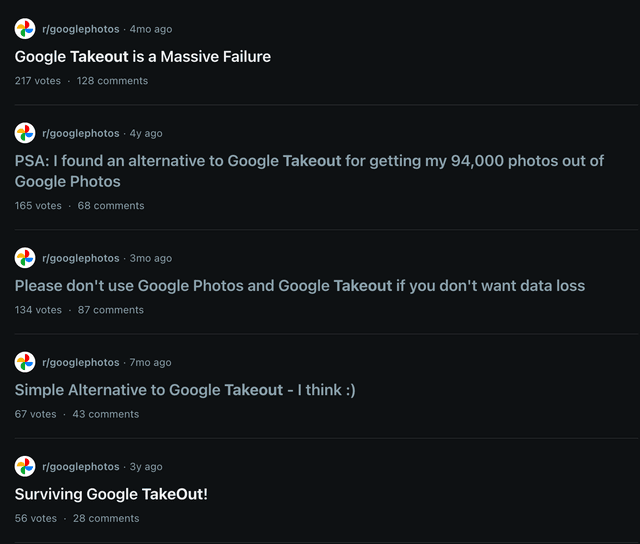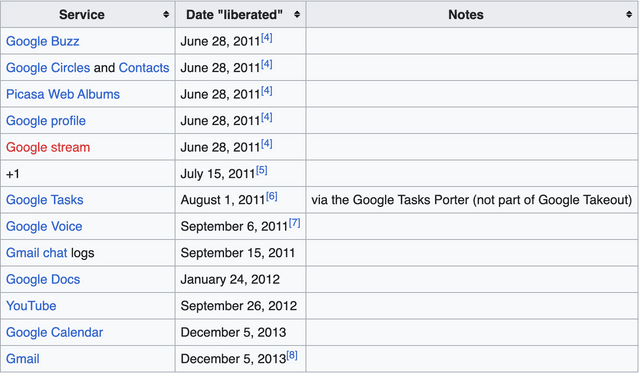As a photo storage product, most of our customers are looking to migrate their existing libraries from other similar products. Given their distribution power, that is mostly iCloud and Google Photos.
For someone migrating hundreds of GBs of photos, videos, and a lifetime of memories, this process is riddled with anxiety.
- Will I lose any photos?
- Will the location, date and other metadata I have painstakingly added, be migrated?
- Will the quality of my photos be preserved?
- ...
This anxiety could last for hours or days, given the volume of data involved.
Having gone through this process ourselves, and having helped over a thousand customers pull out of Google Photos, we should let you know that the anxiety is warranted.
Takeout - like it's trash
Google has a separate product, called Takeout, that theoretically allows you to export all your data - in batches of 50 GB zip files.
This is where things get difficult.
Your albums can be split across different zip files. Also, Google splits the
metadata from their original files and puts them in a separate JSON file. Now
these JSON files and their corresponding media files can be in different zips.
Now to solve this, you will have to unzip all the files (hopefully disk space is cheap) and combine the subfolders together to merge the media and metadata files.
You will then have to write a script to embed the metadata Google has stripped from your original files. This workaround is so tedious, there are a bunch of paid and free services that just solve this.
But hey, there are more edge cases.
- If you have multiple files with the same name, the
JSONs will collide - You only have 5 attempts to download. If you fail, start over.
- If you like taking incremental backups, tough luck, there is no differential sync.
Now, one could dismiss this as ignorance — the team working on it might not be aware of these issues, However, their users have been complaining about this for ages.
r/googlephotos is filled with rants, some more than 5 years old.

API access
Google does offer APIs for Takeout. But these are limited to particular countries (E-U can guess which ones), and does not support data exports from Photos, Email, and Drive.
There is also the Photos API, but they do not allow downloads in original quality. More importantly, their terms forbid you from consuming the API to build a competing service.
Do not make a substitute for Google Photos.
Do not use this API to create, train, or improve (directly or indirectly) similar or competing products or services.
This hurts any Google customer who wants to take their data out - either to have a secondary backup or to move to another service.
And why would Google make this any easier? They are earning upwards of $2.5 Billion from Google One subscriptions. Not to forget the moat they have for training large vision models.
History of Takeout
All of this is surprising given how early Google started working on Data Portability.
Takeout was launched in 2011 by an internal Google team called The Data Liberation Front, that started working in 2007 from their Chicago offices.
To give some context to where we are in the timeline, in 2007, Google was primarily known for the search engine and Gmail. Chrome would only launch a year later, as would the first Android Phone.
The Google Takeout launch came at the same time as Google+. This came on the back of walled gardens and data portability becoming talking points in context of Facebook’s rise, fights between Google and Facebook around sharing of contacts data, and the FTC rapping Google over Google Buzz’s privacy concerns.
Data portability was looked at as a competitive advantage by Google for its fight against Facebook over social dominance.
At launch, Takeout supported exports of Buzz, Contacts, Circles, Picasa, Profile and Stream. Takeout expanded over the next few years to include more services that Google offered. While there were lots of updates in the first 1-2 years after launch, things slowed down after 2013.

In 2018, in light of GDPR, and its specific data portability requirements, Google launched Data Transfer Project in partnership with Microsoft, Facebook and Twitter - Apple joined a year later.
Because GDPR encouraged data portability, the Big Tech companies worked together to move data to each other’s services along with a few other competitors - Box, Dropbox, Flickr, SmugMug. Just like Google’s earlier work, it saw a lot of development in its first year before eventually tapering off.
Google was an early leader in Data Portability. However, the impetus to launch and improve it only happened because of external pressure - competitive advantage or regulatory push. With fresh pressure from anti competitive regulators across the world, one could hope it makes Google prioritise portability again.
What you could do
So, in light of all this, what can you, as an end consumer, possibly do?
Raising awareness would go a long way to push Google to fix some of these issues. This includes being vocal about this on social media or personally letting people know about these practices. The more Google thinks this is creating a negative brand perception, the better the chances that they will listen.
There is also the policy angle. While the company has so far been deaf to its paying customers, it listens to lawmakers. So if you are in the EU, reach out to your DPA: https://www.edpb.europa.eu/about-edpb/about-edpb/members_en
And if you are an existing Google customer who wants to Takeout their data, you might want to check out these - Youtube videos, Reddit posts, and these free and paid tools.
What Google should do
- Allow API access for data exports.
- Return the same bytes that were uploaded (without splitting metadata).
- Support differential sync to make periodic backups viable.
If a company as small as Ente can provide a desktop app and a CLI with differential sync for exports, Google surely has the engineering bandwidth to do the right thing.
All this said, we are fans of the product that is Google Photos. Right from the Picasa days, to post the Bump acquisition, they have been pushing the boundaries on what a photos app can do. While there are certain aspects that we don't agree with, we look up to them for their product experience.
But Takeout in its current state is a reflection of a lot of things that are wrong at Google - promo-driven development, lack of empathy and malicious compliance.
Google should be held to higher standards.